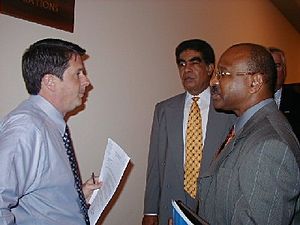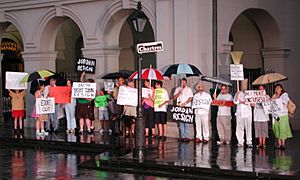Eddie Jordan (attorney) facts for kids
Quick facts for kids
Eddie Jordan
|
|
|---|---|

Jordan (right) with David Vitter (left) in 2003
|
|
| United States Attorney for the Eastern District of Louisiana | |
| In office 1994–2001 |
|
| President | Bill Clinton |
| Preceded by | Robert J. Boitmann |
| Succeeded by | Jim Letten |
| District Attorney of Orleans Parish | |
| In office 2003–2007 |
|
| Preceded by | Harry Connick Sr. |
| Succeeded by | Keva Landrum-Johnson (Acting) |
| Constituency | New Orleans, Louisiana |
| Personal details | |
| Born | October 6, 1952 |
| Education | Wesleyan University (BA) Rutgers University (JD) |
Eddie Jack Jordan Jr. (born October 6, 1952) is an American lawyer. He served as the top prosecutor, called the District Attorney, for Orleans Parish in Louisiana. He held this job from 2003 until he stepped down in 2007.
Eddie Jordan is a member of the Democratic Party. He was the first African American to be elected to the District Attorney position in Orleans Parish. He announced he would resign on October 30, 2007. This happened after a court made a big decision against his office. The court ruled that some employees had been dismissed unfairly.
Contents
Early Life and Education
Eddie Jordan was born to Mr. and Mrs. Eddie J. Jordan Sr. He grew up in a neighborhood called Pontchartrain Park in New Orleans. This area is part of the Ninth Ward.
He finished college at Wesleyan University in Connecticut in 1974. After that, he received a scholarship to study law at Rutgers University in New Jersey. He graduated from law school in 1977.
After law school, Jordan worked as a lawyer in Pennsylvania for about four years. In 1981, he moved back to Louisiana. He taught law at Southern University in Baton Rouge. The next year, he became a licensed lawyer in Louisiana.
Career as a Prosecutor
In 1984, Eddie Jordan returned to New Orleans. He worked as an assistant U.S. Attorney. This means he helped the main U.S. Attorney, John Volz, with legal cases.
Later, in 1994, President Bill Clinton chose Jordan to be the United States Attorney for the Eastern District of Louisiana. In this role, he oversaw a major case. This case led to the imprisonment of former Governor Edwin Washington Edwards. Jordan became well-known on television during this time. He was often seen with his unique mustache and a derby hat.
In 2001, Jordan left his job as U.S. Attorney. He then started working in private law practice.
District Attorney of Orleans Parish
On November 5, 2002, Eddie Jordan was elected as the District Attorney. He took over from Harry Connick Sr., who was retiring. Harry Connick Sr. is the father of the famous singer Harry Connick Jr.. Jordan won the election against another Democrat, Dale Atkins. He received 52 percent of the votes.
Jordan officially started his new role as District Attorney in 2003.
Court Case and Resignation
After Jordan took office, a jury decided that he had violated employment laws. The court found that many white employees were dismissed from his office. They were replaced mostly by African American workers. The jury ruled that this was unfair.
On March 30, 2005, a federal jury found Jordan responsible for this. His office was ordered to pay $2.4 million to the former employees. Jordan tried to appeal the case, but he lost.
The city of New Orleans faced a challenge to pay this large amount. The Mayor, C. Ray Nagin, stated that the city could not afford the payment.
Challenges and Public Criticism
During his time as District Attorney, Jordan faced criticism. The rate of convictions for serious cases, like murder, was low. For example, in 2003 and 2004, the conviction rate for murder and attempted murder was only 12 percent. The national average was much higher, around 80 percent. His office's overall prosecution rate was also low.
Jordan also faced criticism for releasing suspects in important cases. In July 2007, he released a suspect in a serious case involving five teens. Jordan's office said they could not find a key witness. However, the police later held a press conference and presented the witness.
By mid-2007, many people in New Orleans were unhappy with Jordan. They were concerned about the low conviction rates for serious crimes. On July 12, 2007, City Council member Shelley Midura asked Jordan to resign.
As the pressure grew, Eddie Jordan resigned from his position as District Attorney. Keva Landrum-Johnson, a long-time prosecutor, took over as acting District Attorney.
Recognition
In 2005, Eddie Jordan was honored. He was inducted into the Louisiana Political Museum and Hall of Fame. This museum is located in Winnfield.
Other sources
- The Washington Times article
- The Washington Post article
- Best of New Orleans article
- WDSU News article
| Legal offices
|
||
|---|---|---|
| Preceded by Harry Connick Sr. |
District Attorney, Orleans Parish, Louisiana 2003–2007 |
Succeeded by Keva Landrum-Johnson (Acting) |
 | Stephanie Wilson |
 | Charles Bolden |
 | Ronald McNair |
 | Frederick D. Gregory |


